Let’s assume you’re a startup b2b business. Where would you find the best developers to bring your business dream to life? Some people swear by in-house development teams – they’re more ‘dedicated’ with better experience, I hear. Others will tell you freelance devs were the key to bootstrapping their business early on.
I’ll tell you that it all depends on your needs, but you’ve probably heard that more than once. What I’ll do differently now you’re here is compare all three so you know exactly what you’re getting with each. The final decision is still up to you anyways; that is after I furnish you with the facts.
First off, what does it mean for a developer to be in-house, dedicated or freelance?
The classification of whether a developer or software team is in-house, dedicated, or freelance is basically down to where they work from and how many hours they commit to your task.
In-house team
An in-house team is a development team or single developer ‘in-house’ that is, employed by you and working full time for your organization. Full-time in-house developers could work remotely or from your office building, depending on the arrangement. If they’re remote but fully hired by your business, then we like to call those dedicated developers.
A freelance team/developer
A freelance developer is a work-from-home developer you contract on a needs-to basis with set-in-stone deliverables over a specific timeframe. Freelance developers and the teams they create are the rockstars of the development ecosphere. They’re sometimes great devs with crazy talent, but without some of the professionalism you’d get from an in-house dev.
Dedicated developer
A dedicated developer is a freelance dev you’d hire and take off the freelance market for the period they work on your project. It’s basically hiring a dev who identifies as a freelancer for an in-house role. Depending on the project’s scope, the contract for this hiring may span just weeks, months, or extend years.
In-house vs. freelance vs. dedicated developer
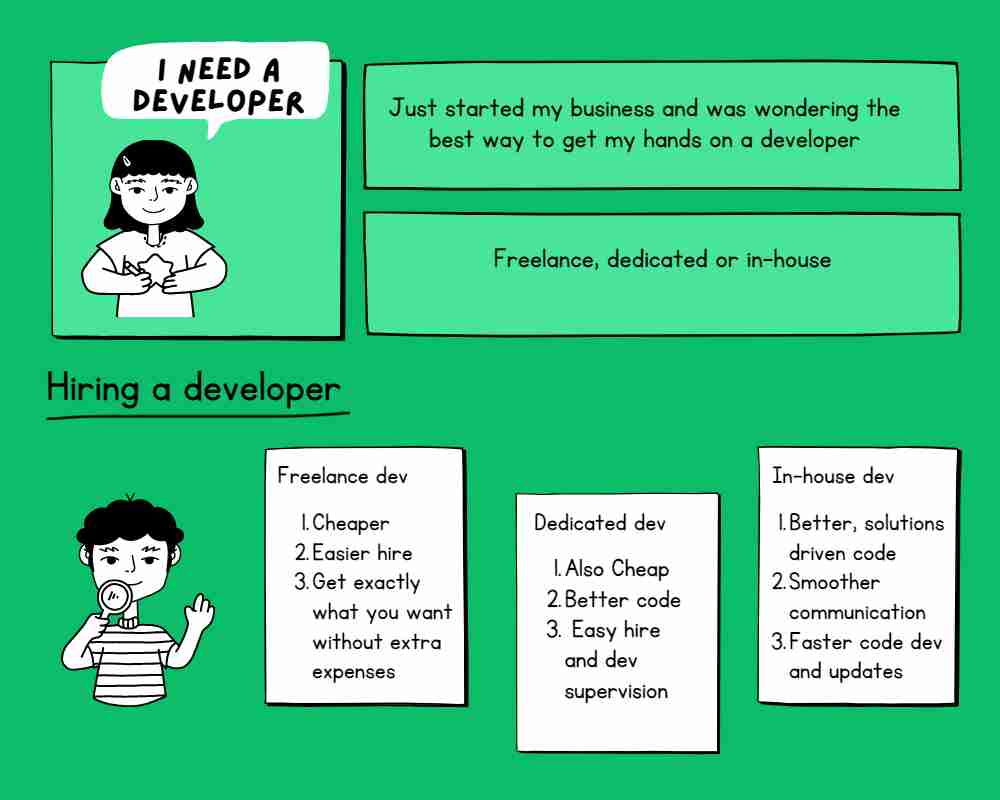
The definitions already give a hint as to what to expect with each dev category but let’s be more detailed.
What are the advantages of hiring an in-house developer
You get a developer that better connects with your values and brand identity
If you set up shop for a developer in-house, it means they’ll be firmly integrated into your organizational structure and workplace culture. They’ll have a firm grasp of your goals, how you plan to achieve those goals, and the necessary bits required to effect the hows of goal getting. With this information, they can better adapt the solutions they create to go hand in hand with the company’s objectives.
Sometimes, the subtle design and performance cues that flow over from a business’s approach to doing things are what distinguishes a software solution. Picture Apple, for instance; the privacy-focused business ethos and thirst for excellence is well reflected in practically all tech products they ship.

You also get a tech specialist and consultant
When you hire any of the other developer categories, be it freelance or dedicated, you’re essentially hiring to fulfill a set objective. In-house developers fulfill set objectives, and where the need arises, they can proffer expert advice and consultation as part of their service bundle. You know, for those times when you’re not sure whether a full-on dedicated app or a web app is all your business needs.
Unbridled communication
You know what they say about effective communication – it’s the essential sauce for cohesion, efficiency, and productivity in today’s workplace environment. With in-house developers, communication is direct. There’s no need to rely on virtual routes of communication (zoom, email, text) where context is often omitted, details condensed, and misinterpretation abound. You get to speak to your software developer when you need to. And not just you; every member of the team has direct unbridled access to the developer.
Agile development
Critical bugs can come up after you ship a major update; you might decide at the last minute to push or pull a new feature. Because in-house developers exist in-house and are well in sync with matters arising and the dynamic state of things, they are better suited to implementing changes when you need them and fast.
What are the disadvantages of in house developers
Costs
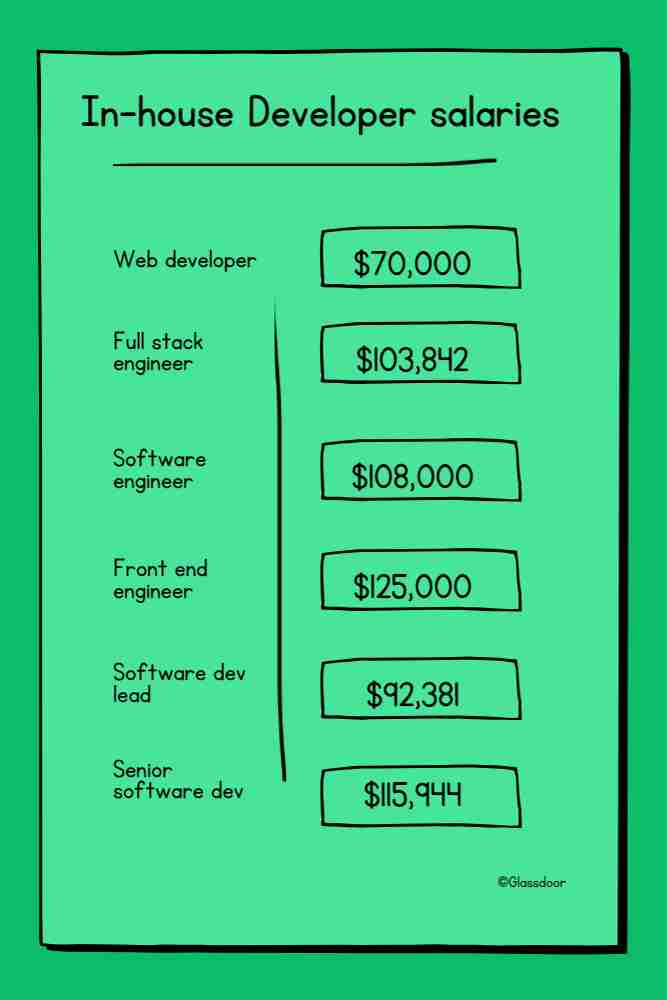
This is a recurring theme with everything in-house. Hiring a developer who’s worth their onions full time is an expensive endeavor, what with developer salaries averaging a high $70,000 In the United States and much of the first world. And that’s just basic salary. If you want to be a good employer, you still have to pay benefits, cover insurances, and bonuses.
There’s a high attrition rate
If your in-house developer is good enough, chances are they’re already seeking better-paying positions at the Googles and Snapchats of the software development world. I mean, you can’t blame them for that. Still, if a great software developer leaves at a critical point of your business cycle, it could be potentially impactful. Replacing them is no easy task, which leads to the next point.
It can be hard to secure talented developers for in-house roles
Never mind the numerous developer listings on freelance sites like Fiverr and Upwork; great software developers are a scarce commodity. It’s why companies like Google and Snap are constantly at their throats in a bidding war for the best software development talent available. Except you have a humongous budget getting these guys to set up shop in-house and commit to just your business is a difficult stunt to pull.
You can see that most of the disadvantages associated with hiring an in-house developer are related to the operating cost. That’s a roundabout way of saying if capital is not an issue, then you’re most likely better off setting up an in-house software development shop for your dev team. A huge chunk of the big tech companies you know do this because… billion dollar operating capital that’s why.
What are the advantages of hiring a freelance developer
Cost
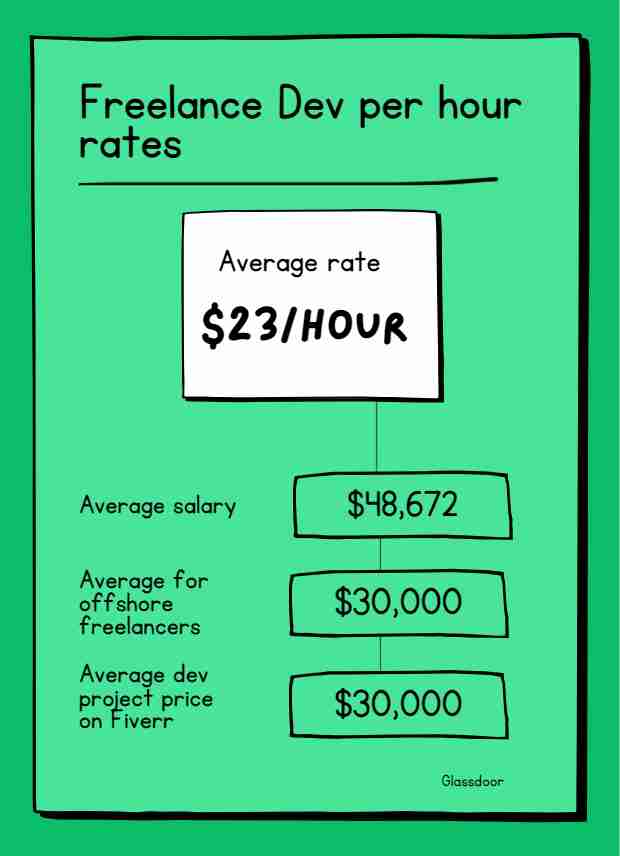
Picking up from where we stopped with in-house developers, cost is the one major reason most business owners tow the freelance route. Pound for pound (the currency, not the unit for measuring weight), and especially when you measure it from the vantage position of deliverables, freelancers are way cheaper than in-house or dedicated developers.
This is especially true if you’re hiring offshore from a country where the cost of living is low. Usually, these are third-world countries.
On-demand access to expert developers
Think of freelance developers as software mercenaries for hire. Most are developers with in-depth, technical expertise in a particular programming niche. Combine all of them and what you get is a highly varied selection of top programmers available for your picking. There’s a freelancer for every programming challenge or complex project you have; you just have to know where to look to find them
The onboarding process is fast and less capital intensive
Hiring an in-house developer is oft a drawn-out process with significant monetary requirements – hiring a recruiter, in-person interviews, posting a job ad on paid job boards, and what not. With freelancers (especially on freelance sites), it’s more of picking from a selection of skilled developers than searching for one from the ground up. This shaves off most of the hiring cost and the time required to effect the hiring process.
Freelancing is mostly pay-as-you-go (code)
What this means is you only pay for the services you need. I guess it’s still related to the cost advantage associated with freelancing. The key takeaway is that your business tends to operate more efficiently with freelance developers, especially as it concerns operating costs. On the other hand, this only holds true when you effect a conversely efficient freelance developer hiring process.
Freelance can act as a segue to full time
I personally know many businesses that take this approach of hiring a software developer as a freelancer first and using that time to vet their efficiency and productivity before onboarding them as full-time employees. It’s a win-win for both parties (freelance developer and company), and it acts as an effective way of preventing the resource wastage that occurs when companies hire and fire software developers – many developed countries have laws that guarantee severance packages for developers whose contracts were ended abruptly.
What are the disadvantages of hiring a freelance developer

The freelance barrier
Or, as I like to call it, the dearth of freelancer workplace integration and workplace cultural deficit. Those are all big words but what I’m saying, in essence, is, freelancers are not fully integrated into your workplace structure and culture.
Depending on the business, this can manifest as problems as small as missing deadlines or as significant as shipping out a software product that doesn’t align with your values, or worse, with your customers.
Communication is not as fluid
Yes, today you have Zoom, slack, and all the other workplace collaboration tools that make workplace communication a breeze, but sometimes a 30 minutes in-person meeting is all you need to iron that design idea conflict.
With freelancers, you also have to consider time zones and language barriers. The best freelance web developer available to you might live somewhere in China and not be fluent in English. This communication deficit can manifest as missed deadlines, difficult troubleshooting, or botched products.
Contract terms with contract like execution
Remember I said freelancers were mercenaries? Well, like the typical mercenary, they usually only deliver on the project deliverables – no extra support, product ideation, or any of that stuff you’d get by default with full-time developers.
Fair to note that this is an issue that can be addressed by providing very detailed project requirements encompassing the through and through of what’s needed to go from idea to launch.
But then again, most freelancers will charge extra for the extra trouble, sometimes reaching what you’d pay a full-time developer for the time it took to get the project to completion. You can’t eat your cake and have it, I guess.
There’s a security risk with freelancers
When you outsource a software development project to a freelancer, you typically give them total control over that project and all its associated dependencies. This could mean exposing your entire software architecture to a stranger.
But let’s assume this is a kind stranger who’s to, however, say that they wouldn’t market off a solution they’ve developed for you for which you own the copyrights. Remember, many freelancers live in countries with very lax copyright and intellectual property laws.
What are the advantages of hiring a dedicated developer?
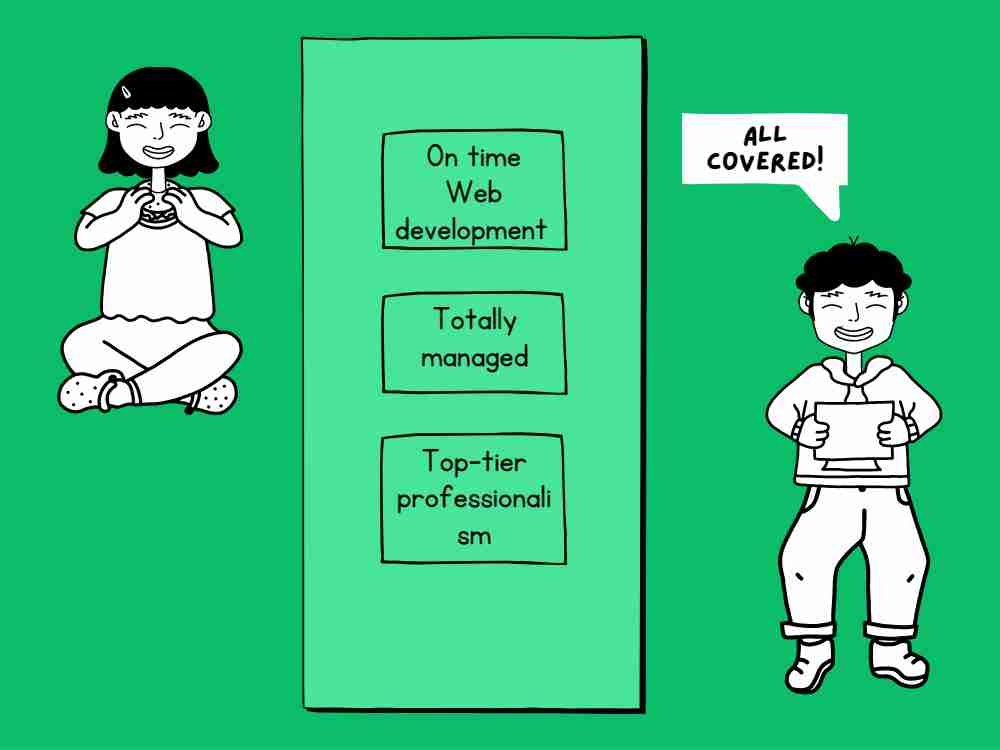
Let me prefix this by saying the dedicated developer category is basically an abridgment of freelance and full-time. You get a freelance developer who’s onboarded as a full-time employee but only for a specific period. What are the advantages?
Cost
If you wanted a slice of the full-time developer experience at a sometimes sizable discount, then you’d be happy with a dedicated software developer. Note that I said a slice, not the full cake. While they come close to replicating the full-time developer experience, dedicated developers still fall short in some areas.
You get better developer scrutiny and accountability
Definitely better than what you’d get by just hiring freelance developers on a whim. This is because most dedicated developers for hire usually interface with customers via an agency. It’s the agency’s job to vet their developers, and some do that to great effect.
So if someone upped and sold your software after your contract with them closed, there’s someone to report to for some compensation and possible punitive measures.
Same on-demand access to a diverse set of professionals that’s obtainable via the freelance route
Like the freelance developer pool, the market for dedicated developers is awash with developers with diverse skills available on-demand.
Management and micromanaging is transferred to someone else
All you have to do is specify your project requirement in detail, and the job gets done. If job quality is not up to the quality you bargained for, you simply file a complaint, and most times, you get compensated for the subpar software product. With freelancers recovering your money after a botched job is a tricky prospect with poor success rates
What are the disadvantages of hiring a dedicated developer
Fluid Communication is still an issue
Communication is improved, no doubt because you’re typically dealing with a more seasoned professional who’s focused on just your project, but it’s still not up to par with what you’d get with an in-house developer. That’s because most dedicated developers work remotely just like their freelance counterparts
Hiring a dedicated developer can pan out to be expensive
On paper, the cost of hiring a dedicated developer might be lower than what it takes to hire an in-house dev, but many times this cost can escalate to very high sums. Like I said, dedicated developers usually interface with business owners through an agency. This agency, or better put, third party, can add administration costs that effectively up your expenses. So while the developer might list $10,000 as their pay on their profile, when you factor in sign-up costs, taxes, VAT, and all of that stuff, you might be paying closer to the in-house pay scale than you’d imagine.
So, which should you choose
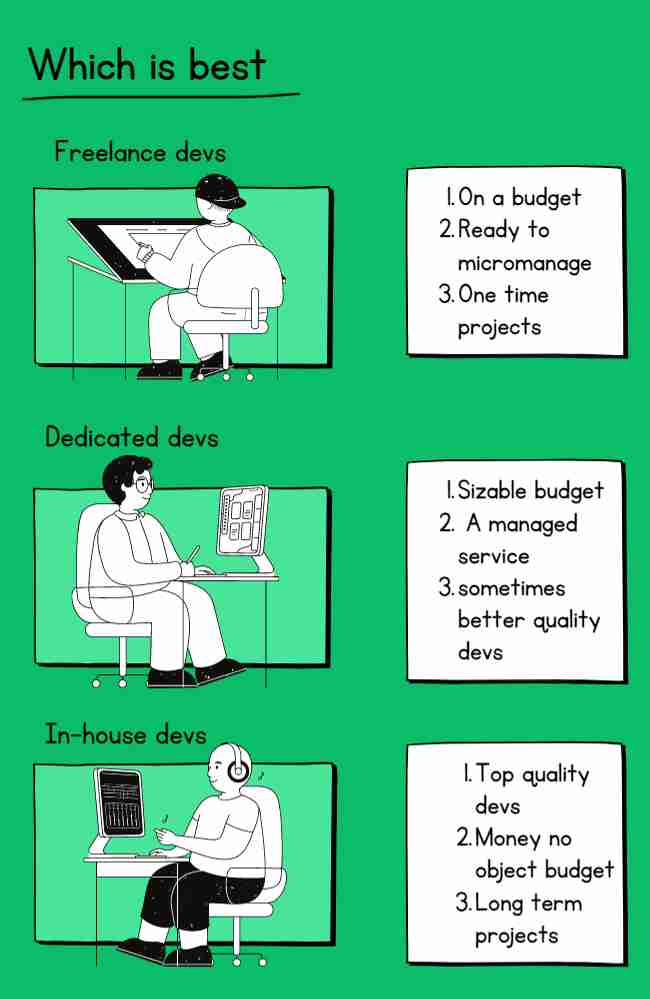
Again, like I said earlier, it’s all down to your needs
If you have a big operating capital and want the best quality software development work with little headaches and an all-round smoother experience, hiring an in-house developer with the skills you need is your best bet.
If you have a sizable budget and want some of the professionalism and good bits you’d get if you went in-house at a discount, then the dedicated developer route is right for you. Note, however, that you don’t get the full in-house developer perks plus, if you’re not careful, you might end paying just as much as you’d pay for an in-house developer. Here’s a guide to hiring a dedicated developer so you don’t fall down that rabbit hole
Freelance developers are the quick-fire way to get your software development project started at a budget price. There are significant drawbacks, but most of them can be mitigated with some clever freelance developer hiring strategies. See how you can do that in this guide to hiring a freelance developer.

